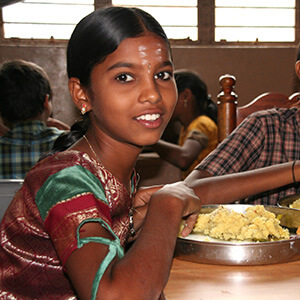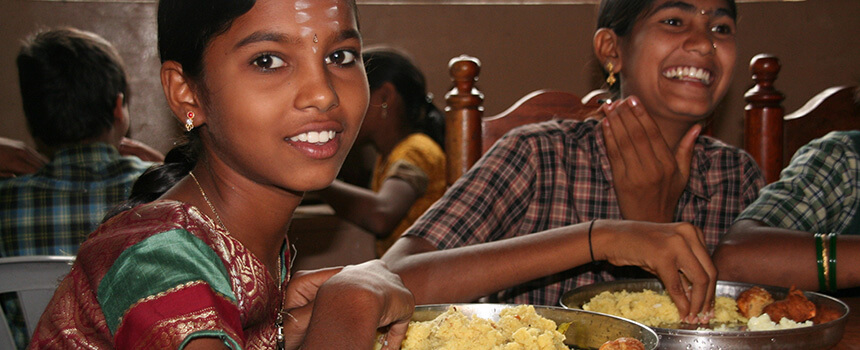 With healthy food to a school diploma
With healthy food to a school diploma
School lunches for children in India
Ten year old Manjula’s father died early in her life and she has been living with her mother and her 19 year old brother (who is disabled) on the outskirts of the village of Rangavvanahalli in Karnataka, India. While her mother was working as a day-labourer, both children were often left to their own devices and could not go to school. When a social worker of the organisation Vikasana heard of her story, she offered to have Manjula enrolled and cared for in the school in Vikasana. The school gives children from poor families all-round care, with the aim of getting them integrated in a regular school. That gives them a chance for a better future. Today, Manjula is happy to live among 34 other children at the school. Because of the regular and nutritious meals she is receiving, she is thriving and has become a good pupil. English is her favourite subject.
Necessity
Healthy meals and education for children from poor families in Tarikere, India.
Activity
The organisation Vikasana buys healthy food and provides the children with three balanced meals per day.
Countable effort
Number of meals that can be provided to pupils as a result of the donation.
Result
The consequences of malnutrition in children have been overcome and their cognitive abilities have improved.
Systemic effect
Educational, and thus future prospects of children from poor families in Tarikere Region have improved long-term.
Background
The Indian government has been promoting basic education for children for about a decade now. However, it is still very common for children in rural areas whose parents are poor to drop out of school after less than eight years. These children are often required to work to contribute to the family income. Being labourers, their parents often earn less than 20 euros per month.
As a result, the children of disadvantaged families have no access to education. And being deprived of a sufficient and balanced diet can also cause cognitive impairments. This is where the Karl Kübel Foundation and their partner comes in: Providing disadvantaged children with a safe home, regular and healthy meals and access to education, and thereby giving them the chance of a self-determined future without poverty.
The good deed
35 children from extremely poor and socially deprived families currently live and are educated at the school in Vikasana. They are given full support, attend school regularly and have the time and space to play and discover their own talents. Their physical welfare is taken care of through nutritious and varied meals as well as medical care.

AboutIndia
Delhi
Capital
1 324 171 400
Number of inhabitants
1723
Gross domestic product per capita per year
131
Human Development Index
In spite of rapid economic growth, many people in India live under conditions of absolute poverty. India also has the most child labourers in the world.
About the organization and further information
Association
Karl Kübel Stiftung für Kind und Familie
Website
https://www.kkstiftung.de/de/index.htm
Initiative für Transparente Zivilgesellschaft




